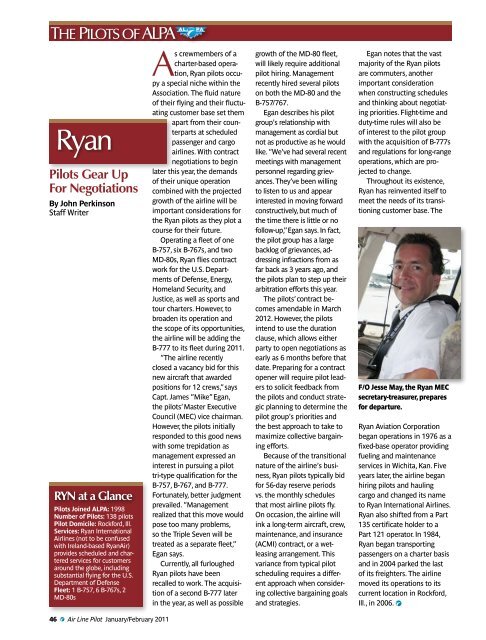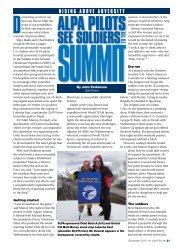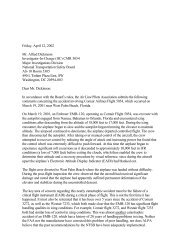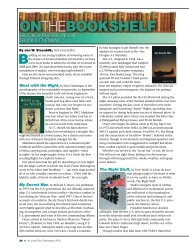The Pilots of ALPA - Air Line Pilots Association
The Pilots of ALPA - Air Line Pilots Association
The Pilots of ALPA - Air Line Pilots Association
You also want an ePaper? Increase the reach of your titles
YUMPU automatically turns print PDFs into web optimized ePapers that Google loves.
THE PILOTS OF <strong>ALPA</strong><br />
Ryan<br />
<strong>Pilots</strong> Gear Up<br />
For Negotiations<br />
By John Perkinson<br />
Staff Writer<br />
RYN at a Glance<br />
<strong>Pilots</strong> Joined <strong>ALPA</strong>: 1998<br />
Number <strong>of</strong> <strong>Pilots</strong>: 138 pilots<br />
Pilot Domicile: Rockford, Ill.<br />
Services: Ryan International<br />
<strong>Air</strong>lines (not to be confused<br />
with Ireland-based Ryan<strong>Air</strong>)<br />
provides scheduled and chartered<br />
services for customers<br />
around the globe, including<br />
substantial flying for the U.S.<br />
Department <strong>of</strong> Defense<br />
Fleet: 1 B-757, 6 B-767s, 2<br />
MD-80s<br />
46 <strong>Air</strong> <strong>Line</strong> Pilot January/February 2011<br />
As crewmembers <strong>of</strong> a<br />
charter-based operation,<br />
Ryan pilots occupy<br />
a special niche within the<br />
<strong>Association</strong>. <strong>The</strong> fluid nature<br />
<strong>of</strong> their flying and their fluctuating<br />
customer base set them<br />
apart from their counterparts<br />
at scheduled<br />
passenger and cargo<br />
airlines. With contract<br />
negotiations to begin<br />
later this year, the demands<br />
<strong>of</strong> their unique operation<br />
combined with the projected<br />
growth <strong>of</strong> the airline will be<br />
important considerations for<br />
the Ryan pilots as they plot a<br />
course for their future.<br />
Operating a fleet <strong>of</strong> one<br />
B-757, six B-767s, and two<br />
MD-80s, Ryan flies contract<br />
work for the U.S. Departments<br />
<strong>of</strong> Defense, Energy,<br />
Homeland Security, and<br />
Justice, as well as sports and<br />
tour charters. However, to<br />
broaden its operation and<br />
the scope <strong>of</strong> its opportunities,<br />
the airline will be adding the<br />
B-777 to its fleet during 2011.<br />
“<strong>The</strong> airline recently<br />
closed a vacancy bid for this<br />
new aircraft that awarded<br />
positions for 12 crews,” says<br />
Capt. James “Mike” Egan,<br />
the pilots’ Master Executive<br />
Council (MEC) vice chairman.<br />
However, the pilots initially<br />
responded to this good news<br />
with some trepidation as<br />
management expressed an<br />
interest in pursuing a pilot<br />
tri-type qualification for the<br />
B-757, B-767, and B-777.<br />
Fortunately, better judgment<br />
prevailed. “Management<br />
realized that this move would<br />
pose too many problems,<br />
so the Triple Seven will be<br />
treated as a separate fleet,”<br />
Egan says.<br />
Currently, all furloughed<br />
Ryan pilots have been<br />
recalled to work. <strong>The</strong> acquisition<br />
<strong>of</strong> a second B-777 later<br />
in the year, as well as possible<br />
growth <strong>of</strong> the MD-80 fleet,<br />
will likely require additional<br />
pilot hiring. Management<br />
recently hired several pilots<br />
on both the MD-80 and the<br />
B-757/767.<br />
Egan describes his pilot<br />
group’s relationship with<br />
management as cordial but<br />
not as productive as he would<br />
like. “We’ve had several recent<br />
meetings with management<br />
personnel regarding grievances.<br />
<strong>The</strong>y’ve been willing<br />
to listen to us and appear<br />
interested in moving forward<br />
constructively, but much <strong>of</strong><br />
the time there is little or no<br />
follow-up,” Egan says. In fact,<br />
the pilot group has a large<br />
backlog <strong>of</strong> grievances, addressing<br />
infractions from as<br />
far back as 3 years ago, and<br />
the pilots plan to step up their<br />
arbitration efforts this year.<br />
<strong>The</strong> pilots’ contract becomes<br />
amendable in March<br />
2012. However, the pilots<br />
intend to use the duration<br />
clause, which allows either<br />
party to open negotiations as<br />
early as 6 months before that<br />
date. Preparing for a contract<br />
opener will require pilot leaders<br />
to solicit feedback from<br />
the pilots and conduct strategic<br />
planning to determine the<br />
pilot group’s priorities and<br />
the best approach to take to<br />
maximize collective bargaining<br />
efforts.<br />
Because <strong>of</strong> the transitional<br />
nature <strong>of</strong> the airline’s business,<br />
Ryan pilots typically bid<br />
for 56-day reserve periods<br />
vs. the monthly schedules<br />
that most airline pilots fly.<br />
On occasion, the airline will<br />
ink a long-term aircraft, crew,<br />
maintenance, and insurance<br />
(ACMI) contract, or a wetleasing<br />
arrangement. This<br />
variance from typical pilot<br />
scheduling requires a different<br />
approach when considering<br />
collective bargaining goals<br />
and strategies.<br />
Egan notes that the vast<br />
majority <strong>of</strong> the Ryan pilots<br />
are commuters, another<br />
important consideration<br />
when constructing schedules<br />
and thinking about negotiating<br />
priorities. Flight-time and<br />
duty-time rules will also be<br />
<strong>of</strong> interest to the pilot group<br />
with the acquisition <strong>of</strong> B-777s<br />
and regulations for long-range<br />
operations, which are projected<br />
to change.<br />
Throughout its existence,<br />
Ryan has reinvented itself to<br />
meet the needs <strong>of</strong> its transitioning<br />
customer base. <strong>The</strong><br />
F/O Jesse May, the Ryan MEC<br />
secretary-treasurer, prepares<br />
for departure.<br />
Ryan Aviation Corporation<br />
began operations in 1976 as a<br />
fixed-base operator providing<br />
fueling and maintenance<br />
services in Wichita, Kan. Five<br />
years later, the airline began<br />
hiring pilots and hauling<br />
cargo and changed its name<br />
to Ryan International <strong>Air</strong>lines.<br />
Ryan also shifted from a Part<br />
135 certificate holder to a<br />
Part 121 operator. In 1984,<br />
Ryan began transporting<br />
passengers on a charter basis<br />
and in 2004 parked the last<br />
<strong>of</strong> its freighters. <strong>The</strong> airline<br />
moved its operations to its<br />
current location in Rockford,<br />
Ill., in 2006.





